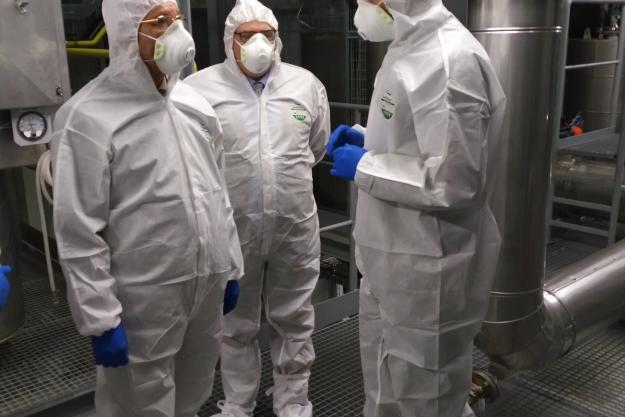
Armistice Commemoration in Ieper, Belgium and Director-General visit to the Belgian destruction facility located in Poelkapelle, Belgium
THE HAGUE, Netherlands — 13 November 2017 — The Director-General of the Organisation for the Prohibition of Chemical Weapons (OPCW), Ambassador Ahmet Üzümcü, called for honouring the memory of those who perished at battlefields of World War I at the Armistice Commemoration in Ieper, Belgium on 11 November.
The ceremony was attended by Her Royal Highness The Princess Royal; the Mayor of Ieper, H.E. Mr Jan Durnez; the Vice Minister-President of Flanders; Ambassadors based in Brussels; Members of the Belgian Parliament; in addition to numerous citizens who gathered to pay homage to those whose lives were destroyed during World War I.
The Director-General, in his speech at the Academic seminar, recalled the horrors of the Great War, including the first large-scale use of chlorine as a weapon in Ieper in 1915 and the first use of sulphur mustard on the battlefield of Passchendaele in 1917.
Twenty years since the entry into force of the Chemical Weapons Convention (CWC) and despite the “great strides in ensuring that we never again revisit the dreadfulness of chemical warfare”, Ambassador Üzümcü expressed regret that “the spectre of Passchendaele still continues to hang over us”.
“One way to preserve the lessons of the past, is to uphold the international norm embodied in the Convention that so many for so long strived to establish”, concluded the Director-General.
The Director-General also visited on 10 November the Belgian destruction facility located in Poelkapelle, Belgium where Old Chemical Weapons (OCW) are identified and destroyed. Ambassador Üzümcü received a comprehensive overview of the different steps involved in positively identifying unexploded ordnance from WWI. He also visited the recently installed Static Detonation Chamber. Since its inauguration in April 2017, more than 1000 OCW items have been destroyed in this facility.
Background
The Armistice that ended World War I is commemorated each year in Ieper, Belgium with an extensive programme of events.
This year’s ceremonies also marked the hundredth anniversary of the conclusion of the battle of Passchendaele, fought from July to November 1917, that claimed the estimated up to 700,000 casualties. At Passchendaele, for the first time the Germans deployed sulphur mustard (mustard gas), the blister agent that burns the skin and can cause blindness.
In 2015, during the centenary of the first large-scale use of chemical weapons at the battle of Ieper, the OPCW Member States reaffirmed their commitment to chemical disarmament in the Ieper Declaration.
As the implementing body for the Chemical Weapons Convention, the OPCW oversees the global endeavour to permanently eliminate chemical weapons. Since the Convention’s entry into force in 1997 – with its 192 States Parties – it is the most successful disarmament treaty eliminating an entire class of weapons of mass destruction.
Over 96 per cent of all chemical weapon stockpiles declared by possessor States have been destroyed under OPCW verification. For its extensive efforts in eliminating chemical weapons, the OPCW received the 2013 Nobel Prize for Peace.
